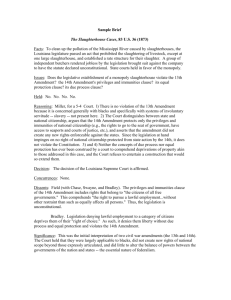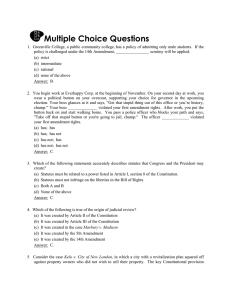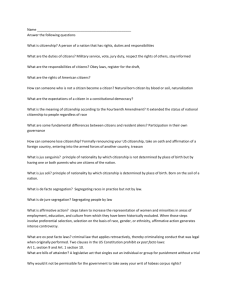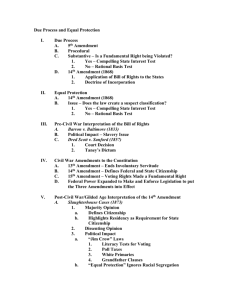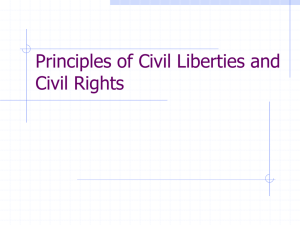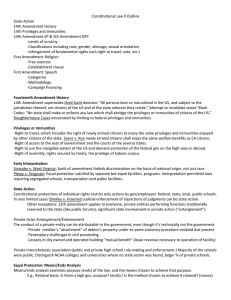14th amendment
advertisement
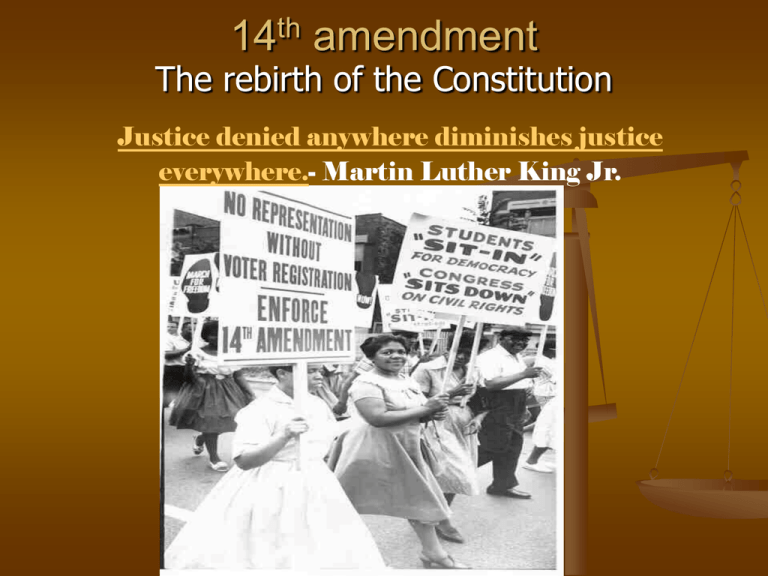
14th amendment The rebirth of the Constitution Justice denied anywhere diminishes justice everywhere.- Martin Luther King Jr. Origins Post Civil War Competing views of peace Lincoln Radical Republicans Wanted to retain power gained during Civil War 13th amendment Harsh war—quick peace Original plan was to re-admit the Southern states after the acceptance of the 13th Presidential Restoration under Andrew Johnson Black Codes passed in Southern states Reconstruction Acts placed the former confederate states under military rule, and prohibited their congressmen's readmittance to Congress until after several steps had been taken, including the approval of the 14th. 1861-1877-Reconstruction Civil Rights Act 1866 Passed over Johnson’s veto Made everyone in US a citizen Cannot deny anyone the rights to contract, own land, sue (attempted to overturn Black Codes) Reconstruction Act 1867 Divided south into 5 military districts To regain admittance to the union states must… 1. draft a constitution which allows black people to vote 2. must ratify the 14th amendment 14th amendment Added in 1868- one of the Civil War Amendments (13,14,15) to protect the rights of newly freed slaves Specifically addressed the states Early cases involved corporations- not civil rights Provisions* • • • • • All persons born or naturalized in the United States, and subject to the jurisdiction thereof, are citizens of the United States and of the State wherein they reside No State shall make or enforce any law which shall abridge the privileges or immunities of citizens of the United States nor shall any State deprive any person of life, liberty, or property, without due process of law nor deny to any person within its jurisdiction the equal protection of the laws *Cited more often in modern litigation than any other amendment Citizenship Defined national and state citizenship Overturned the case of Dred Scott v Sanford (1857) Dred Scott lived in territories where slavery was illegal and sued for freedom Court ruled 6-2 that any person descended from black Africans, whether slave or free, is not a citizen of the United States, according to the U.S. Constitution. Native Americans not granted US citizenship until 1924 interpreted to mean that children born on United States soil are U.S. citizens jus soli, or "right of the territory “The first requisite of a good citizen in this republic of ours is that he shall be able and willing to pull his own weight.” Theodore Roosevelt Privileges and Immunities Echoes language in Article IV Slaughterhouse Cases (1873) Still somewhat vague Louisiana had created a partial monopoly of the slaughtering business and gave it to one company Competitors argued that this created "involuntary servitude," abridged "privileges and immunities," denied "equal protection of the laws," and deprived them of "liberty and property without due process of law.“ Court held that the 14th was not violated and devoted most of its opinion to a narrow construction of the privileges and immunities clause, which was interpreted to apply to national citizenship, not state citizenship. Saenz v Roe (1999) Court used clause to forbid states to reduce welfare benefits to newly arrived residents restricted the right to travel Due Process Clause and Incorporation Identical to 5th amendment except now applies to the states Barron v Baltimore (1833) Court held that the Bill of Rights restricted only the federal government Selective Incorporation addition of the 14th applied portions of the amendments to the States through a series of Supreme Court decisions Gitlow v New York (1925) Gitlow was arrested for violating New York law punishing the advocacy of overthrowing the government Argued the arrest was a violation of the 1st amendment Court ruled that the 1st amendment applied to the states- incorporated freedom of speech Palko v. Connecticut (1937) Court held that some Bill of Rights guarantees--such as freedom of thought and speech--are fundamental, and that the Fourteenth Amendment's due process clause absorbed these fundamental rights and applied them to the states. Incorporated Rights vs. Non-Incorporated Rights See handout Substantive Due Process protected the rights that were not specifically listed in the Constitution core of the law must be fair “liberty” interests “property” interests •Abortion (Roe v Wade) • Marriage (Loving v Virginia) •Privacy (Texas v Lawrence) Mildred and Richard Loving Equal Protection Clause No unreasonable discrimination under the law If a law treats people differently, the state must demonstrate a good reason for it. Our constitution is colorblind, and neither knows nor tolerates classes among citizens. In respect of civil rights, all citizens are equal before the law” --Justice Harlan’s dissent in Plessy v Ferguson 1896 Origins of Equal Protection The Declaration of Independence, “We hold these truths to be self-evident, that all men are created equal…” Framer’s concerned with equality in terms of inherited privilege. Article I, section 9 -"No Title of Nobility shall be granted by the United States” Constitution tacitly endorsed a flagrant denial of equality—slavery. Article I, section 2, apportions Representatives according to the number of "free persons" and three-fifths of "other persons." The Bill of Rights establishes a number of prohibitions against action by the federal government that would deny equal treatment under the law (Amendments 1, 4, 5, 6, 8). 13th Amendment abolished slavery in 1865. Equal Protection Clause was crafted after the Civil War in order to give the newly freed slaves legal protection. Specifically worded to provide protection of the rights of all "persons." Thus it has recently been used in the defense of the rights of non-citizens. Is this a violation of my equal protection? • Three levels of analysis • United States v. Carolene Products Co. (1938) • A 1923 act of Congress banned the interstate shipment of "filled milk" (milk with skimmed milk and vegetable oil added). A manufacturer, indicted for shipping filled milk, challenged the law. The Court upheld the act. • "Footnote Four“- Justice Harlan Stone applied minimal scrutiny (rational review) to the economic regulation in this case, but proposed a new level of review for certain other types of cases. • Legislation aimed at discrete and insular minorities, who lack the normal protections of the political process, should be an exception to the presumption of constitutionality, and a heightened standard of judicial review should be applied. • Strict scrutiny first applied in Korematsu v US 1944 Level of Review Ends Means Strict Scrutiny Compelling Narrowly tailored Important Substantially Related Legitimate Rationally Related Race (Brown v Board) national origin religion Intermediate Gender (US. v Virginia) Rationality Age, Disability Poverty sexual Evans) orientation (Romer v Equal Protection v Equality of Condition Equality of Condition- a form of egalitarianism which seeks to reduce or eliminate differences in material condition between individuals or households in a society. Equalizing income and/or total wealth Affirmative Action- a policy or a program which gives preference to some group of people with the stated goal of countering past or ongoing discrimination against them. It can take many forms including priority acceptance for government contracts, education, or employment and/or language training or vocational training. "Equality, in a social sense, may be divided into that of condition and that of rights. Equality of condition is incompatible with civilization, and is found only to exist in those communities that are but slightly removed from the savage state. In practice, it can only mean a common misery." –James F Cooper Equality may perhaps be a right, but no power on earth can ever turn it into a fact.- Honore De Balzac
